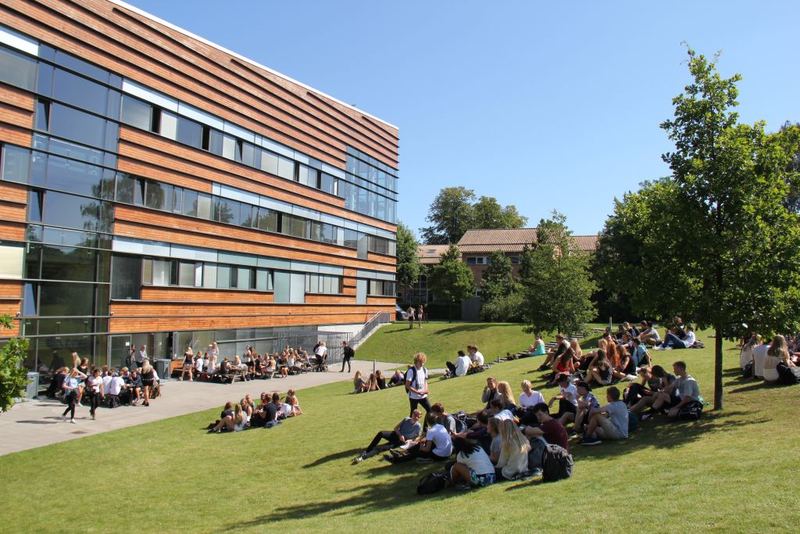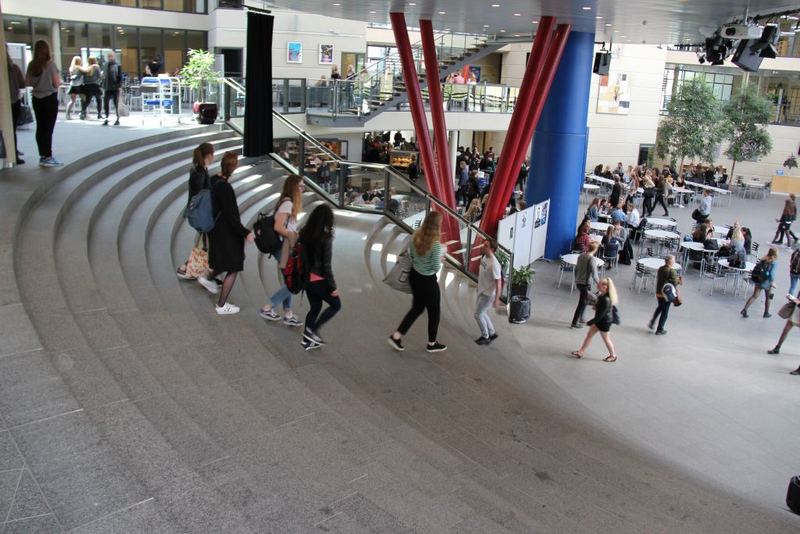
Focus on Danish colonial history has surged over the past couple of years in not only public discourse but also in the country’s educational system. After lying dormant in the public’s consciousness for years, more teachers have begun incorporating aspects of Danish colonialism in their classes and discussing the impacts on both Danish society and former colonies.
But students at Nærum Gymnasium, a high school north of the capital, Copenhagen, say they are eager to learn more about their country’s colonial history.
“Students should be informed about this even though the past actions by our ancestors is not our direct responsibility,” said Sofie, a student at Nærum Gymnasium – a ‘gymnasium’ is the Danish equivalent of a high school. The Source recently visited the school to ask students about their experiences learning about Denmark’s colonial history.
Nærum Gymnasium is situated in Greater Copenhagen in a relatively affluent area. Gymnasiums are for students generally aged 16 to 19 and are attended by most young Danes after grade school. In 2020, 72 percent of students applied to a gymnasium after grade school. Most gymnasiums are part of the public education system of Denmark, with only a few being privately operated.
“We no longer have slavery, but systemic racism exists in schools, in prisons, everywhere and is against basic human rights,” Viktor, a classmate of Sofie’s, said, drawing a direct line between Denmark’s roughly 200-year-long colonial presence in Africa and the Caribbean to the social problems of modern-day Denmark. This issue has become prevalent in public debates in recent months as demonstrations have sought to highlight systemic racism.
Generally, the students at Nærum are eloquent and seem to have formulated concise and strong opinions on the matter of colonial history already, perhaps underlining the growing focus on it in public discourse, whether on television, newspapers or other media in Denmark. When speaking to students, there seems to be a suggestion that this topic is taking up a larger part of the lives of ordinary Danes – and that public education should reflect that. However, in its current form, this is not something that the Danish educational system is capable of quickly changing. Following a long tradition on educational policy, the government of Denmark does not decide directly what is taught – or not taught – in high schools across Denmark.
While a change to that system is not planned, the students at Nærum seem to have reached a consensus. As another student at the high school, William, stated, “There should be a better balance in the amount of history we focus on in our curriculum. We have tons about the Second World War or Romanticism. And close to nothing about our past on the West Indies.”
When asked if he thinks the curriculum is up to date, William responded, “In no way is it up to date.” He receives nods from his fellow students.
Despite students emphasizing a lack of focus on colonial history in the classrooms, several of the school’s history teachers have already noticed a growing trend of teaching colonial history. One teacher, Hanne Lindbo, specifically remembers a symposium about Denmark’s relationship to the Virgin Islands being put together to mark the Transfer Centennial in 2017. She said it opened her eyes to the question of who has the right to narrate history.
Lindbo said she has taken on a new critical view of not only the transfer but also on other aspects of Danish colonial history. She now sees, for example, that Governor Peter von Scholten was not a liberator in 1848 when he released the islands’ slaves, but that the slaves took their freedom. Learning that the Virgin Islands’ population was not included in the referendum regarding the transfer, she began to incorporate the subject in her classes far more than she had previously.
Nærum Gymnasium history teacher Sune Berthelsen also has recognized the trend. With a sense of pride, he says that the students now are extremely receptive to discussing Denmark’s colonial past and the marks it has left on the country today. For him, though, it is not just whether children or young adults know their historical facts. “Delving into our own past can assist us in becoming better people. We can use this knowledge to be wary as to not offend others,” he said.
For Berthelsen, it is important to introduce primary sources from the perspective of the local population and not just the Danish colonial power and to reckon with an idealized version of the country’s past deeds. “It opens up history and allows us to have a common language about our shared past. If you understand that you can regard our colonial history from the side of those who were colonized, then we can talk about it – then we can change history.”

But what is the quality of the education young people in Denmark receive about their country’s colonial past, exactly? One student, Anthony, said that, “In grade school, it was even worse. There the focus was more on how Denmark was not as bad as other slave nations, and the actual slaves were merely a footnote.”
While the Danish directive on high school history makes no specific requirements about which subjects must be included or how much emphasis be put on them, the elementary school curriculum has one requirement for colonial history. Students must learn about Denmark’s abolition of the slave trade in 1792 and its aftermath, but there’s no guidance on what teachers should focus on or how to do it.
The Danish Ministry of Education declined to provide comment for this article, but according to Christian Vollmond, an educational consultant of history in Denmark who acts as the direct link between high school teachers and the ministry, said the government refrains from detail-oriented control of education and that to do so would deny teachers their freedom to curate their classes individually and autonomously.
Vollmond, who himself is affiliated with the Virgin Islands through his historical research and publications, explained that, generally, political directives on education are not focused on specific content, but rather on providing the students with a set of skills to better understand the world of today through historical trends. As such, it becomes the teacher’s prerogative to compile their own curriculum. Vollmond acknowledged this could lead to teachers using texts that might be regarded as controversial, but he perceives that as very low risk.
At present, no nationwide polls have been conducted and there are no comprehensive data on student’s or teacher’s opinions on teaching colonial history in Denmark. Even so, Vollmond is unequivocal in his assessment of the role of Danish colonial history in today’s history teaching, and whether it is being emphasized more in classes. “Yes, absolutely,” he said. “Almost everyone is incorporating it in their classes nowadays. It is definitely a bigger part of education now than in the last 10 years.”
Students will also have a bigger say on the topics of tomorrow, Vollmond said, referring to legally binding agreements that students must be consulted both when deciding the topics in their high school history classes and developing new terminology in those classes.
Much suggests that the time is ripe for a more extensive focus on Danish colonial history in the classrooms of the Scandinavian country. The students at Nærum Gymnasium, for one, are ready – and the teachers say they are set to meet their wishes. As Berthelsen put it, “We are educating the young today to make them better citizens of the world tomorrow.”


